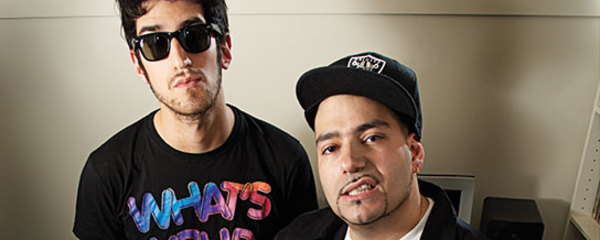Chromeo In the Studio
Chromeo could just as easily be a house party band from 1987 as 2007. The […]
Chromeo In the Studio
Chromeo could just as easily be a house party band from 1987 as 2007. The […]

Chromeo could just as easily be a house party band from 1987 as 2007. The Montreal/New York duo’s concoction of Revolution-era Prince funk, Jam-and-Lewis pop, and Jheri Curl-oiled camp is built from scratch on a wealth of vintage synthesizers and drum machines. Despite their home arsenal, the band keeps it simple on stage. Frontman Dave 1 (David Macklovitch) wields a mean Gibson Flying V guitar, while his comrade P-Thugg (Patrick Gemayel) mans the synths and robotically serenades the crowd with a Talk Box tube tucked into one cheek. XLR8R visited the duo at A-Trak’s Montreal recording space to discuss the virtues of electronic drums and the art of Peter Frampton-style synth-talking.
XLR8R: Do you stick to the factory presets in your synthesizers or do you usually tweak the sounds on a computer?
P-Thugg: Most of them don’t have factory presets. The only ones that do are the Yamaha DX-7, the [Roland] Juno 106, and the Sequential [Circuits] 6-Trak. When I buy a synth, I just restart all of the patches and start from scratch.
Dave 1: If I come in and have a certain sound in mind, P knows that I’ll never have the patience for him to run them through factory presets. What we usually do is I’ll have a reference on a record I’ll play him. I’ll [say], “Hey, something like this.” It could be something like Evelyn “Champagne” King’s “I’m in Love” [sings song’s melody]; I’ll play that for him and he’ll take a synth that’ll approximate that sound, and then we’ll personalize that afterwards.
P-Thugg: The other synthesizers, like the Moog Prodigy and the Korg Mono/Poly, [have] no presets, just buttons that you tweak and turn until you get your sound. I’m usually good at going back to whatever I have because I know which does what sound, and which oscillators to bring where.
Dave 1: Basically, P and I are in different cities a lot of the time. When I’m in my own city, I usually work on writing lyrics and coming up with melodies or song titles and basic ideas for the songs. P uses that time to be a sound technician, and he creates archives of sounds that are inspired by classic records. We study these things very closely. When it comes down to mixing the record, that’s when I come a little bit more into play on the technical level. I’ll pay attention to the way things are panned, the way that Prince would pan certain sounds and could create certain effects. Sometimes, you want to do a little nudge, a little wink to those techniques. To a lot of people, our music is fun or feel-good music and it’s true, there is that funny element to it and a quirky dimension. But what gives it the depth is that it comes from a really diligent study of classic records. It’s the same way hip-hop producers–which we were before–would study old Bob James or Roy Ayers records.
What’s the advantage of using electronic drums?
P-Thugg: A really punchy sound, and I kind of like the synthetic side of it. I don’t really like live, organic drums when they’re recorded. They sound flat to me.
Dave: They only sound good on [Michael Jackson’s] “Billie Jean.”
P-Thugg: And there’s probably an [Linn] LM-1 under it anyways. They used to just run a drum machine and play over it.
Dave 1: Another thing that is cool about drum machines is that you can really detune the sounds and [make them] sound really synthetic and crazy–like Prince’s famous detuned handclap… It doesn’t sound like a drum anymore but it’s such a beautiful sound.
What’s the advantage that the Talk Box has over the vocoder?
P-Thugg: The vocoder instantly gives you a computerized voice, but the Talk Box is a bit more human. It depends on who is playing it; every Talk Box player will have a different sound even if the synth sound that’s feeding it is the same. It’s a very personal instrument that you have to learn.
Dave 1: We use the Talk Box, the vocoder and we use AutoTune. We love all of them.
What piece of gear are you most proud of?
P-Thugg: Probably my Moog Prodigy. It just sounds great. [Or] the Sequential Circuits 6-Trak.
Dave 1: Our secret weapon on the first album was the cheesiest keyboard of them all [the Korg M1], but that’s how we got the drums on “Needy Girl.”

